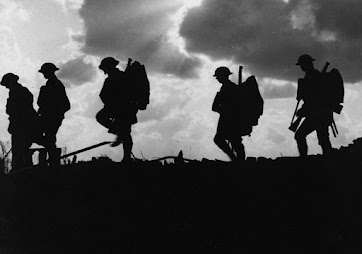War is Kind by Stephen Crane - Essay Question
‘In the poem “War is Kind”, Stephen Crane generates satire by meaning the opposite of what he says’. Do you agree? Discuss with reference to the poem.
War is Kind is
an ironical, paradoxical poem under the themes of fabricated grandeur of war
and horror of war. It’s composed by the modern American poet, Stephen Crane;
generating the tragedy and horrors of war which the naive humans are compelled
to face. It’s a classic example that generates satire by paradoxical
statements.
The poem encloses three plights in war; a young maiden who’s lover dies at war, a babe whose father dies at war and a mother who loses her only son due to war. Crane attempts to console them, but can’t help but to be sarcastic and paradoxical, regarding the issue; seemingly conveying that death was certain to all who’d enter the battlefield. The battlefield is paralleled to a slaughterhouse, where none could step out alive. Men with huge pride; romanticized ideas of war; enter war only to return home in soulless corpses; bestowing sorrow to their loved ones. Thus, it concludes, in my perspective that the poem generates the opposite of what the poet says, in paradoxical statements.
“Do not weep, maiden, for war is
kind”; in a very commiserating approach, Crane shares his deep
sympathies towards the agonized maiden, who lost her lover, in war, yet he
can’t help his nerve to hint sarcastically, the ironic truth that the maiden
should have expected; that death is certain for anyone who steps into the abattoir.
“Because your lover threw wild hands in
the sky” with the last motion of pain and calling out towards the heavens,
pleading the mercy, the lover would never receive, conveys the futility of
expecting; hoping for an alternate; positive result through war; when your heart
knows deep down that it was certain death that lay behind the facade of smart
uniforms, good pay and glorification. The writer ironically hints the truth in
a cynical tone; that it’s pointless to cry, for the war has already passed out
the order of certain death.
Every man who went to combat and expired, had their fates
written since the day they were born to this world; “These men were born to drill”; to die in war. The participants who
were inspired and convinced by the magnificence of the army uniforms; the
honour and splendor they’d confer upon their family and nation, ultimately
became victims of politics, their blindness led them to them to face the
reality, the sinister and violent side of war, their eventual destruction. By
the constant repetition of “war is kind”
the writer emphasizes how political elements encourage innocent, unripe young
men become soldiers and unknowingly
corner them to the end of the cliff; sacrifice their lives unknowingly; as
their conscience is fogged by the romanticized idea of war. Crane promotes his
soothing words with irony, sarcasm and paradox. There it elucidates to me, that
it portrays the poet generating satire by meaning the opposite of what he says.
“Do not weep, Babe, for war is kind”
with sympathy intertwined with the ruthless reality, the poet
pinpoints the truth to the lamenting child. The infant’s father was a brave
soldier whom blindly embraced the folds of death, by walking into the already
warned clutches of the God of war and death. Implying that no matter how many fruitless,
yet poignant tears it cries, the reality; death can’t be reversed, for those
whom brought their own downfall upon themselves by associating with sectors of
death.
The authentic truth stands before those who are not blinded;
delusional by grandeur of war elaborated before them by the puppeteers; those
whom commence war; giving little regard for the lives that would be lost in
this futile act of tearing each other apart. “Do not weep, for war is kind”; paradoxically
repeating that war is kind; brings up its futility; creates satire by the
attempt in consoling everyone by the same statement; bringing forth the reality
that most escape from, or tends to be lost sight of , unless men don’t keep a
tight grip on greed, for honor and respect. Thus without eradicating these
diseases which infect their right mind to act upon; they’d keep on letting pain
befall on them in vain attempts; going through extremes unknowingly inviting
death to their doorstep. Hence the above discussion depicts the poet’s success
in demonstrating satire by meaning the opposite of what he says.





Comments
Post a Comment